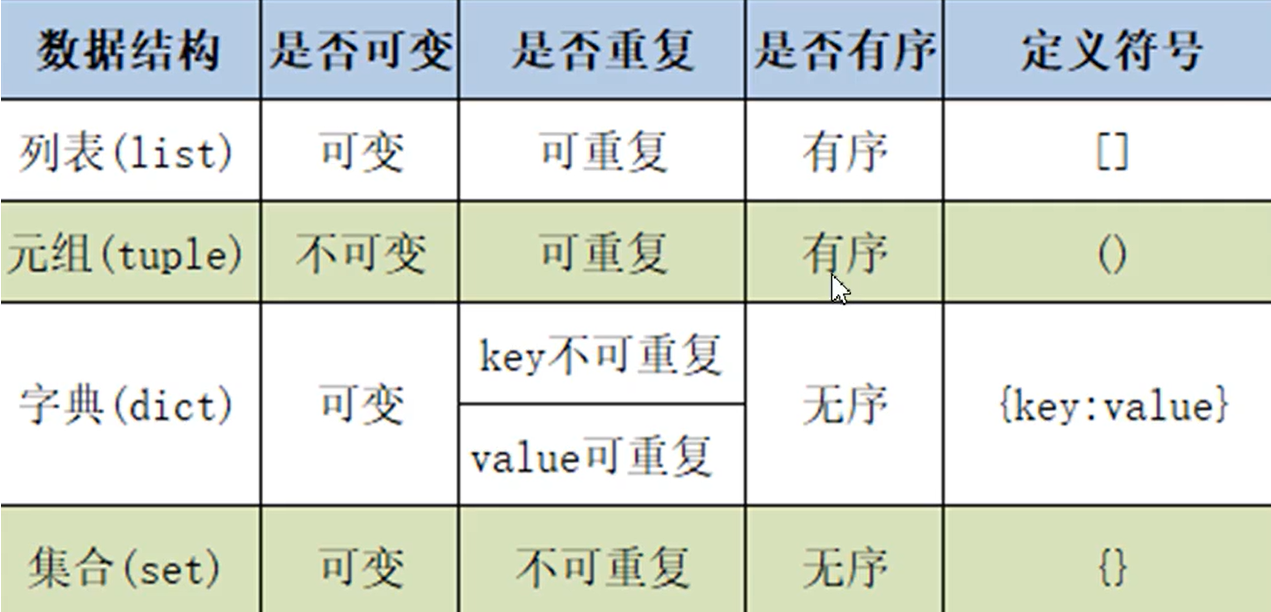python一个键多个值 以及列表,元组,集合,字典辨析
2023-12-14 23:31:45
a={1:[1,2]}
c,b=a[1]
print(c,b,type(c)) #1 2 <class 'int'>
c=a[1]
print(c,type(c)) #[1, 2] <class 'list'>a={1:(1,2)}
c,b=a[1]
print(c,b,type(c)) #1 2 <class 'int'>
c=a[1]
print(c,type(c)) #(1, 2) <class 'tuple'>a={1:{1,2}}
c,b=a[1]
print(c,b,type(c)) #1 2 <class 'int'>
c=a[1]
print(c,type(c)) #{1, 2} <class 'set'>
注:str 也是不可变的,不可以增删改
如:s='hello' s=s+'world' 会导致id(s) 发生变化 而:lst.append(300)????? id?? 不变?
? ? ? 都可以for来遍历
?列表:sort倒序为true? ?可以变化更改? ,可以排序? ?
Lst=list(['hello','word',98,98])
print(Lst[0],Lst.index(98)) #hello 2
Lst=[10,20,30,40,50,60,70,80]
Lst1=Lst[-1:6:-1] #start stop step -1就是最后一个,倒序
print(Lst1) #[80]
Lst=[10,20,30,40,50,60,70,80]
Lst1=Lst[1:6:2] #[20, 40, 60]
Lst.append(100) #[10, 20, 30, 40, 50, 60, 70, 80, 100]
Lst.extend(Lst1) #[10, 20, 30, 40, 50, 60, 70, 80, 100, 20, 40, 60]
Lst[1:3]=[] #[10, 40, 50, 60, 70, 80, 100, 20, 40, 60]
Lst.sort(reverse=True) #[100, 80, 70, 60, 60, 50, 40, 40, 20, 10]
New_lst=sorted(Lst,reverse=True)
Lst.sort(reverse=False) #[10, 20, 40, 40, 50, 60, 60, 70, 80, 100]
Lst.append(Lst1) #[10, 20, 40, 40, 50, 60, 60, 70, 80, 100, [20, 40, 60]]
Lst.insert(1,90) #[10, 90, 20, 40, 40, 50, 60, 60, 70, 80, 100, [20, 40, 60]]
Lst.remove(70) #把70去了
Lst.pop(1) #把第二个数去了
Lst=[i*i for i in range(1,10)]
Lst.clear() #清空值
del Lst #删除列表
字典:可以变化更改,不可排序,键不可重复
d=dict(name='jack',age=20) #{'age': 20, 'name': 'jack'}
d1={'age':20}
d['name']
d.get('name')
d2=d1.get('name','jack') #'jack'
d.keys() #dict_keys(['name', 'age'])
d.values() #dict_values(['jack', 20])
d.items() #dict_items([('name', 'jack'), ('age', 20)])
for c in d:
print(c) #name age
Items=['fruits','books','others']
Price=[98,22,11,25]
d2={item.upper():prise for item, prise in zip(Items,Price)} #元素少的做标准
#{'BOOKS': 22, 'FRUITS': 98, 'OTHERS': 11}
d3 = {name for name,score in d2.items() if score >= 90} #生成式
print(d3) #{'FRUITS'}元组:
t=()
t=tuple()
t2=('python','world',98)
t3=(1,)
print(t[1]) #world
集合:
快成八股文了,不写了,等我用上集合这东西了再补充,没见用过。
没隔多久就用上了,我回来补充了。。。
s=set()
s={} #空字典
s={10,20,30}
s.add(80) #{10, 20, 30, 80}
s.update({100,200})#{10, 20, 30, 80, 100, 200}
s.update([100,200])#{10, 20, 30, 80, 100, 200} 没变化
#所以upgrate 更新的元素是唯一的,无所谓集合还是数组,都无法重复
s.remove(100)
s.discard(100000) #不会报错,其他和remove一样
s.pop() #随机移除一个数,无参
文章来源:https://blog.csdn.net/qq_72985002/article/details/135004042
本文来自互联网用户投稿,该文观点仅代表作者本人,不代表本站立场。本站仅提供信息存储空间服务,不拥有所有权,不承担相关法律责任。 如若内容造成侵权/违法违规/事实不符,请联系我的编程经验分享网邮箱:veading@qq.com进行投诉反馈,一经查实,立即删除!
本文来自互联网用户投稿,该文观点仅代表作者本人,不代表本站立场。本站仅提供信息存储空间服务,不拥有所有权,不承担相关法律责任。 如若内容造成侵权/违法违规/事实不符,请联系我的编程经验分享网邮箱:veading@qq.com进行投诉反馈,一经查实,立即删除!